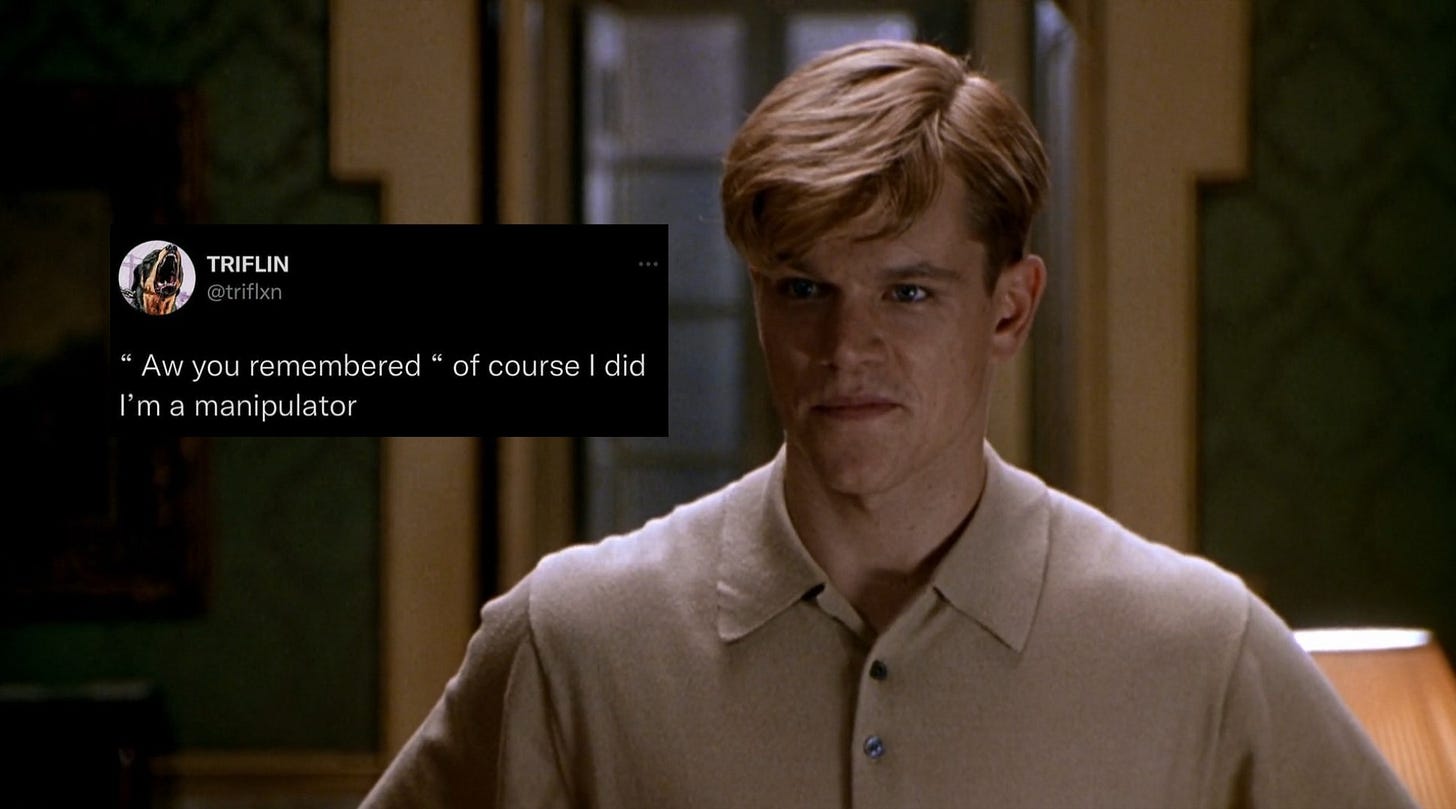post-discussion recap / the talented mr. ripley
the summer i murdered my crush and then wore his identity around europe.
Hurrah to our final summer reading discussion! Thank you everyone for being part of this journey, whether you chose to just participate for one month or took part in them all… I’m honored to be thinking, speaking, hanging out in this communal space with you! I will be publishing a newsletter update very soon on the future of this book club and how I’ll be using this Substack in general!
(Also, I’ve noticed the chat picking up a bit again, so note this recap covers everything up to Aug 31)
It’s the 1950s. Tom Ripley is a young man living in New York, just eking out a living and running small-time scams on the side. One day, a wealthy man named Herbert Greenleaf tracks him down. Thinking Tom is a good friend of his son Dickie, Herbert offers him a proposition: head to Mongibello, Italy and persuade Dickie to come home to America. Seeing this as an opportunity to escape his dead-end life in New York, Tom agrees to go.
Once Tom lands in Mongibello, he meets Dickie and Marge Sherwood (Dickie’s situationship). They spend their time lavishing around on boats, in restaurants, on the beach. It’s idyllic, but over time, Tom grows increasingly obsessed with Dickie. While Dickie is fond of Tom, their relationship turns sour when Dickie walks in on Tom wearing his clothes. He becomes disgusted, especially with Marge alleging that Tom is queer.
Despite the tension, the pair go on a trip to San Remo together. Dickie is cold and Tom believes he will soon be cut off. Unwilling to let go of his lifestyle, Tom decides to kill Dickie, bludgeoning him with an oar and sinking the boat to rid the evidence. Tom then becomes Dickie through changing his mannerisms, wearing Dickie’s clothes, and lightening his hair so he looks more like Dickie’s passport photo. He swiftly moves to Rome, forges Dickie’s signature to get access to his trust fund, and writes letters to Marge and Herbert explaining that he will not be coming home/seeing them for the time being.
When Dickie’s old friend Freddie Miles shows up unexpectedly, Tom freaks out and murders Freddie as well. He tries to get rid of the body but he’s careless and it turns up anyway. Tom becomes the center of the investigation, and he ends up having to retire his Dickie persona out of safety. The Greenleaf family, concerned about the whereabouts of their now missing son, hire the private investigator Mr. McCarron.
To clear his name, Tom leaves forged notes to stage Dickie’s “suicide” and goes so far as to forge a will, where Tom is to be the recipient of all of Dickie’s assets. He seemingly gets away with both murders, but the novel ends with him feeling unsettled and paranoid that he will be found out one day.
This is the first prompt I had listed down in the Reading Prompts section of the book’s introductory post. I think we managed to answer it: Did you find Tom Ripley likable or relatable in any way? What makes a morally gray character redeemable vs. irredeemable?
Leticia argues: “the fleeting passages where Tom acknowledges how deeply lonely and unfulfilled he feels are so raw and that vulnerability is the most likeable part of him imo. the way he distracts himself from his deepest insecurities by throwing himself into travel and materialism.....he's just like us fr fr 💅rip tom ripley, you would have loved quiet luxury tiktok. i dont find him redeemable bc he clearly dont feel any remorse, like chrissy mentioned that he just straight up forgot that he was a murderer 😭😭 but at the same time, i'm rooting for him to learn to love himself (while he's in prison)”
Rosa Kirk-Davidoff: “I think Tom’s queerness is what gave me the most empathy for him, because he has so much yearning for a life that he can’t have. His change of emotions/ confidence that come with being Dickie have a lot to do with money but also come from Dickie having the freedom to fully be himself and not be afraid of what others are thinking of him/ how he’s being perceived.”
We also discussed Tom being “a mirror”, mirrors as a motif in general, and the purposes of third person limited narration for a mystery thriller book:
Keep reading with a 7-day free trial
Subscribe to High Brow to keep reading this post and get 7 days of free access to the full post archives.





